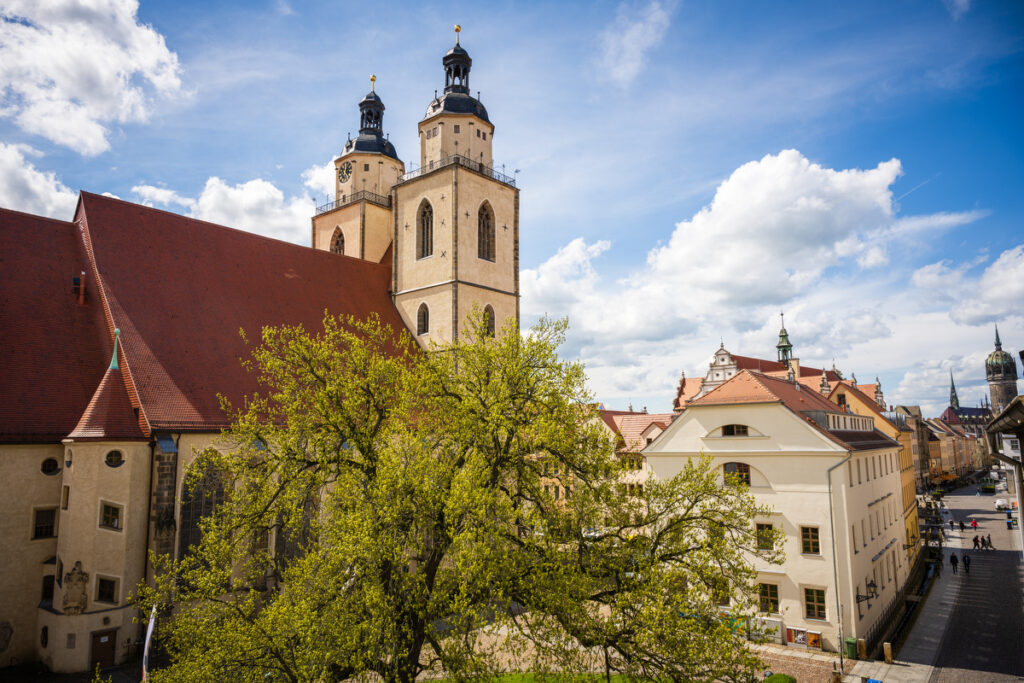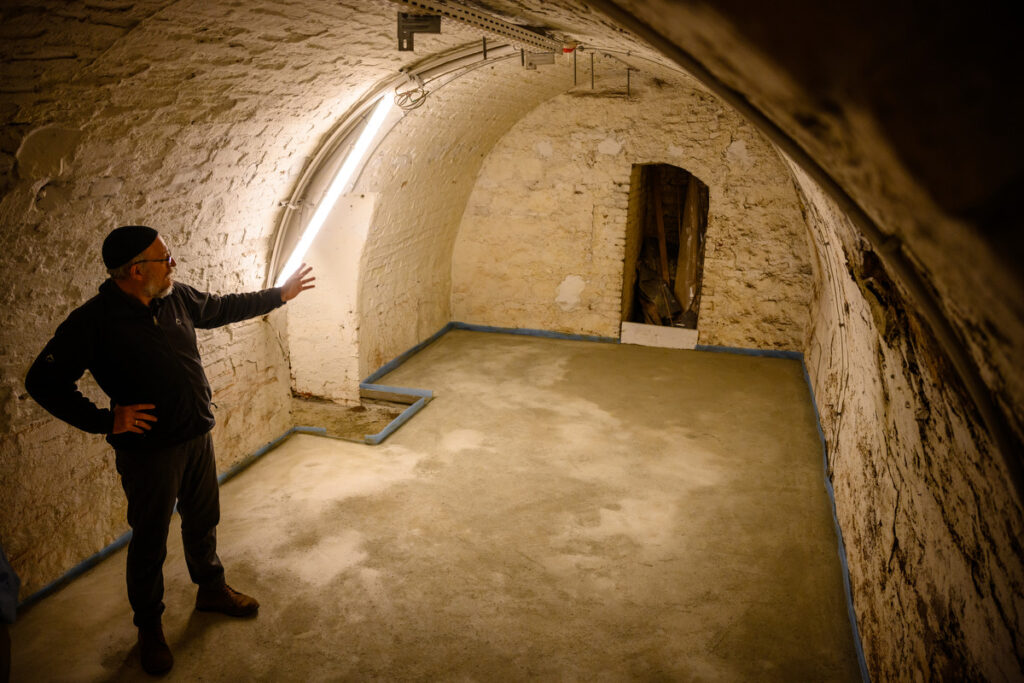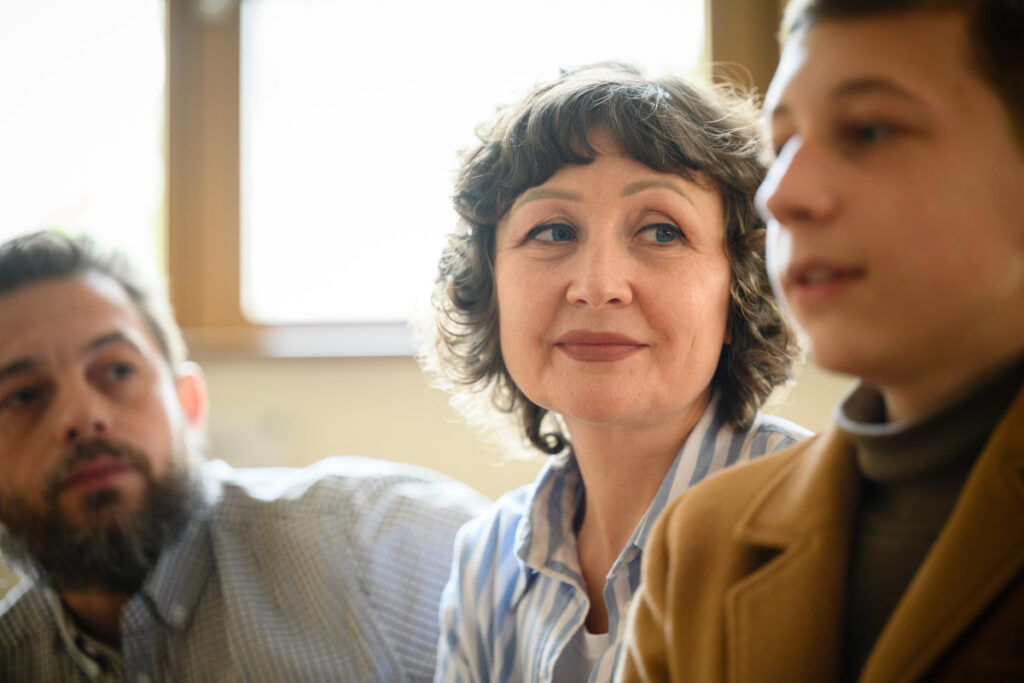Feature
Sheep Hearing the Voice of Their Shepherd
Ukrainian refugees are finding refuge in the Word of God while living in Wittenberg, Germany.
“I am the good shepherd. I know my own and my own know me” (John 10:14). These familiar words sounded different to American ears as Pastor Andriy Honcharuk proclaimed the promises of the Good Shepherd in Ukrainian to His sheep in Wittenberg, Germany. Those gathered for the Divine Service that morning heard the voice of the Shepherd in their own tongue, even though they currently reside in a foreign land after being forced to leave their homes in Ukraine.
The International Lutheran Center at the Old Latin School (OLS) in Lutherstadt Wittenberg hosts about 30 resident Ukrainian refugees. Many of those refugees are families, consisting mostly of mothers and children. No one foresaw this use of the OLS when The Lutheran Church—Missouri Synod (LCMS) and its partners dedicated the remodeled building on May 3, 2015, as a place for people to gather, study and learn about the Reformation.
Providing a Home in the Old Latin School
The LCMS worked with German partner church the Selbständige Evangelisch-Lutherische Kirche (SELK) and Concordia Publishing House to renovate the building to provide a place for Lutherans to study and stay in Wittenberg. The OLS stands adjacent to St. Mary’s Church, in which Luther preached nearly 2,000 sermons.

As part of that project, a chapel was constructed on the ground floor. That chapel now hosts two Divine Services each Sunday morning. The first, at 9 a.m., is conducted in English, and the second at 11 a.m. is in Ukrainian. Honcharuk has been called by the SELK to serve this congregation of Ukrainians in Wittenberg as long as the Lord allows.
The Rev. Dr. Wilhelm Weber, managing director of the International Lutheran Society of Wittenberg, which oversees the OLS, noted that there are about 1,000 Ukrainian refugees in Wittenberg, but that number changes as refugees move in and out. Many of the first refugees have found jobs and moved on to other locations. One of the families who first stayed at the OLS lives nearby and still meets with Weber for coffee occasionally. Those who remain are working toward different pursuits, while praying for peace in Ukraine and hoping for a possible return home. Unfortunately, for many there is no house to which to return, as warfare has destroyed most of what they left behind.
Presently, the refugees living in the OLS are from the Lutheran church in Ukraine, though that was not always the case. Early on, the OLS hosted Ukrainian refugees assigned by the government or who heard about Wittenberg and were looking for a place to stay. The Rev. James Krikava, then the Synod’s regional director for Eurasia, acted quickly as soon as the violence began in Ukraine. He contacted Weber, and they made plans to house those in need in Wittenberg.
“The people of the Synod responded to our plea for contributions quickly. We then looked for places that would work well to help, and the OLS worked perfectly,” said Krikava.
Due to COVID-19, fewer people were coming to the OLS, so space was available. “We tried to combine our mercy projects with Word and Sacrament ministry,” said Krikava. He also noted that the LCMS continues to care for refugees in Romania.
“Thanks to the American support from [the LCMS,] they are very thankful that they can live here for free,” said Weber. In addition, Wittenberg residents have contributed bicycles, clothing and other items for the refugees.
With this new use of the OLS, more space is needed. Weber is overseeing the transformation of the building’s recently excavated cellar into useable space. The progress is slow and suffers from constant pauses due to code requirements and mitigations, but one day soon this space should provide a place for people to gather and cook.

Making Their Way to Wittenberg
“We left our city the very first day when the war started,” said Natalia Zubrytska. “I cannot even tell you my feelings as [a] mom. It was as if I was paralyzed. Moreover, because a month before I had buried my husband. So we still were, you know, in this grieving season.”
Zubrytska related her story of how she grabbed her children and one suitcase to flee her homeland to seek safety. She bought bread and water — just enough to survive — hoping and praying that God would protect them. Their journey led them to Berlin, where she heard from Honcharuk, who invited her to stay at the OLS.
“We were so happy to sing in our own language and to listen to the Word of God in our language, and that was just unbelievable,” Zubrytska said of the first Ukrainian worship service in Wittenberg. “And then some more Ukrainians were coming to us because they learned that we have the congregation here. And so more and more people were joining us, and now, thank God, we have a big congregation.”
“God’s hands … brought us here,” said Tetiana German, another refugee. “The locals were very friendly.”
German and her daughters spent some time living with a German family who helped them acclimate. “And then we learned that there is a Ukrainian Lutheran church, and [we] met Pastor Andriy and Pastor Vadym Kolesnyk. And we started attending the church.”
German’s home in Ukraine was destroyed, and she felt depressed that her daughters had to live through wartime. “After we lost everything, being here means that we are not alone, and we are confident that we will always be helped by the church and by the pastor. … We feel safe here,” she said.
After church, Marharyta Baranova sat between her husband and her son and talked about how they came to Wittenberg. When asked what she prays for, her answer was a sobering reminder that the war interrupts life, yet it does not remove reality from those affected: “I pray that the Lord would bless me with some more years in this world, since I have cancer, so I can spend time with my family.”

Her second prayer is that God would grant peace to her home country and that life there can be restored in some way. Her husband echoed this. He also prays for those in this community in Wittenberg, that they will stay safe and be together. Worship as a family is an essential element in their survival and well-being. Church has become the focus of their week, and they never miss it.
Tamara Brezhnieva, who is from a city near Kyiv, related that volunteers evacuated the city and put people on buses to get them out of the warzone. Brezhnieva’s husband, who is a soldier for Ukraine, told her to go. Since she is Lutheran, she started looking for Lutheran Ukrainians as soon as she settled in Wittenberg. One day she saw an article in a local paper about classes being offered by Pastor Weber and his wife, Angelika. She gathered information on the classes and worship at the OLS, and she rejoiced to learn that Zubrytska was teaching English, since the two women knew each other in Ukraine.
“I knew it was God’s providence that took me by the hand and brought me here,” Brezhnieva said.
Now, through the congregation at the OLS, Brezhnieva has learned a new passion: singing. When asked about the importance of the congregation at the OLS, she said, “In spite of the tragedy of the war, I’m among people who constantly support me, and my heart is filled with even more love.” She prays for her daughter and husband daily, and for peace in Ukraine. But most of all, she’s grateful to our Lord.
And the work does not end in Wittenberg. Honcharuk reported that a Ukrainian family visited one day from Luxembourg and invited him to go there. “So we started a new mission also in Luxembourg. First it was in one of the villages, Bison, and then it moved to Luxembourg city. We had 19 Baptisms and 35 people in Easter worship.”
Bringing New Life to an Old Building
Even as these saints dwell in the OLS and Wittenberg temporarily, they seek to benefit their new community. Zubrytska teaches English classes, and Angelika Weber teaches German. Others meet occasionally to watch and discuss movies with other refugees in Wittenberg. Most of the people from Ukraine claim to be Christians, but like all people everywhere, they need to hear the Good News of Jesus Christ.
“The Old Latin School used to be calm and quiet. Now it is busy,” said Zubrytska. “We have English classes, German classes, music classes, and of course Bible studies and worship on Sundays. There is a lot going on.”
“My sheep hear my voice, and I know them, and they follow me. I give them eternal life, and they will never perish, and no one will snatch them out of my hand” (John 10:27–28). As Jesus calls each by name, He does so in their own tongue. Sinners gathered around their Shepherd, hearing His voice and trusting Him for eternal life — that above all else defines these saints living in Wittenberg. War refugees, yes, but also mothers, fathers, sons and daughters. And most of all, they belong to Jesus, their Good Shepherd, who laid down His life for them and leads them to eternal life.
Learn More
- Learn more about the Old Latin School
- Read about a grant program to help congregations care for Ukrainian refugees
- Support the LCMS’ efforts to care for displaced Ukrainians
- Support the work of the International Lutheran Center at the Old Latin School
Share Jesus with the World
Your generosity today makes possible your Synod’s witness and mercy efforts both at home and abroad.
Are you looking to direct your gifts for work that’s more specific?
Visit the LCMS online ministry and mission catalog to find those opportunities most meaningful to you!
Don’t see what you’re looking for?
Contact LCMS Mission Advancement at 888-930-4438 or mission.advancement@lcms.org to talk about all the options available.
Dr. Kevin Armbrust
Director of Editorial for LCMS Communications.

